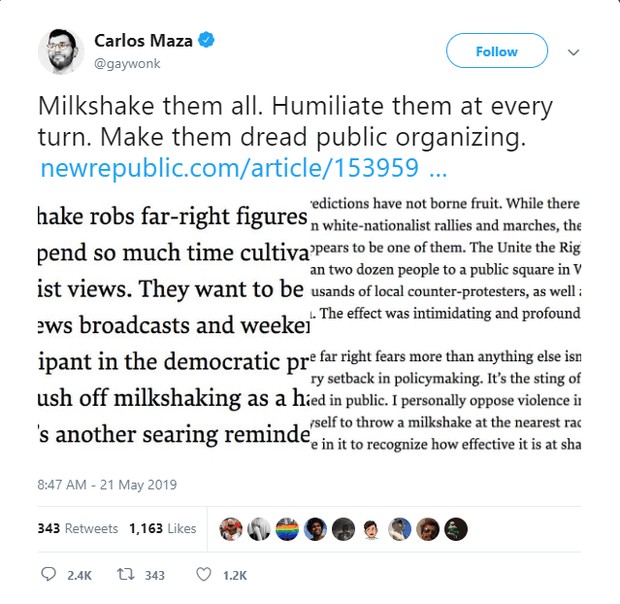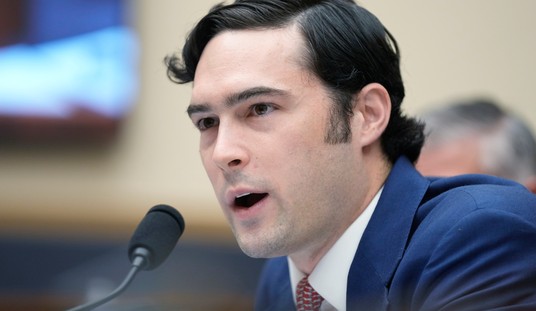
The Vox website is displayed on an iPad held by an Associated Press staffer in Los Angeles, on Tuesday, Sept. 1, 2015. Comcast, which became a TV powerhouse by signing up Generation Xers, is investing in online media outlets like BuzzFeed and Vox that attract millenial viewers. (AP Photo/Richard Vogel)
Earlier this morning I was responding to a writer at The Atlantic who had mentioned myself and a number of other writers at various right-leaning websites who were condemning the mainstream media’s skewed approach of the coverage of Antifa’s attack on reporter Andy Ngo. According to The Atlantic, conservatives were conjuring up this sympathy from the left toward Antifa. The point of my response was to point out that the media was responding completely differently to the attack on Ngo than it would have any kind of violent occurrence where its narrative could have thrived.
Read: “The Atlantic Doesn’t Understand The Media’s Hypocrisy Over Coverage Of Antifa’s Attack On Andy Ngo.”
As if on cue, an article was floated to me at Vox essentially proving my point.
Up to this point, Beauchamp is neutral, but he then quickly dives into throwing Ngo into a bad light by essentially listing why the second narrative is true. He then goes into the attack, saying that he doesn’t know if Ngo started the attack or not, but the 30-second video of Ngo being assaulted by Antifa makes Ngo “clearly comes across as the victim of an attack.”
He writes this despite acknowledging Antifa had mentioned Ngo by name in such a way that would give Antifa members justification for physically attacking him, and its reasons they aren’t shy about using.
Antifa is trying to incite violence against me through disinformation. My family has already been doxed. In their post calling for people to show up Saturday in Portland, they falsely claim I “participated” in an attack on them. This is a lie. Evidence: https://t.co/CO4ebp1rlQ pic.twitter.com/WZjNsH5Q8C
— Andy Ngô (@MrAndyNgo) June 23, 2019
To be fair, Beauchamp does condemn the violence done upon Ngo, and good on him for that. The problem is that it rings hollow as Beauchamp proceeds to caution everyone not to paint Antifa with a broad brush of violence despite Antifa making it clear that violence is acceptable in the face of its enemies. In fact, he goes so far as to note that Antifa hasn’t murdered anyone while alt-right extremists have:
CNN’s Jake Tapper, for example, argued that this was part of a broader pattern of antifa violence — retweeting an interview with Ngo in which he compares antifa to the neo-Nazi who killed Heather Heyer in Charlottesville in 2017.
But antifa has not committed a single murder, at least that we’re aware of. We don’t yet have proof that the people who assaulted Ngo were antifa members (though it seems likely given their history). And the attack on Ngo seems less like a part of a broader pattern of attacks on journalists than it does part of a specific feud between Portland antifa and Ngo; they didn’t appear to target other journalists at the rally in the same fashion (which doesn’t excuse the attack on Ngo).
The problem with this narrative is not that antifa is blameless. Some of its members clearly have crossed the line. It’s that hyping the threat they pose paints a decentralized group with a broad and simple brush, and contributes to a disproportionate right-wing panic in the process.
I need to make two very important points about this part of Beauchamp’s piece. For one, I want to say Antifa hasn’t committed a murder…yet. They certainly do things that could result in someone dying. They have repeatedly demonstrated that they’re willing to club people over the head with heavy objects, and have sent people to the hospital with head injuries, and I’m not just talking about Ngo.
I’d also like to mention that Steven Crowder went undercover with Antifa at one point, and they were planning on using deadly weapons during their “protests.”
No, they haven’t killed anyone, but they are perfectly positioning themselves to do so, and I’m not entirely sure they’re looking to avoid it either.
The other point is that while Antifa is a decentralized group, I’ve yet to see one Antifa group promote non-violence. They relish the idea of the exact opposite. If you do see one, please let me know, but until I see the majority of Antifa groups speak out against violence, I’d consider them an exception to the rule.
In fact, as New York City Antifa tweeted — and was subsequently retweeted by Rose City Antifa, who carried out the attack on Ngo — “there is no debate with people who want to kill you.”
there is no debate with people who want to kill you.
— New York City Antifa (@NYCAntifa) July 2, 2019
Who wants to kill them is left nice and nebulous.
Meanwhile, other decentralized movements, such as GamerGate, made it very clear that violence was not an option in its culture war against its opposition. Those who did promote the idea of violence, or putting people in danger, were quickly shunned and not considered a part of the movement. Antifa doesn’t do this. Violence is a standard rule.
Beauchamp continues by saying that focusing on Antifa’s transgressions is actually distracting us from the real threat, right-wing violence:
As bad as antifa’s transgressions have been, the far right has been worse. There is no antifa equivalent to Heyer’s murder, or the Charleston church shooting, or the attack on a Pittsburgh synagogue. Antifa has no relationship with the Democratic Party nor do its members really support the party; alt-right activists are Trump fans, and at times seem to get tacit support from the White House (again, see Charlottesville). A national focus on antifa can distract from the much greater problem of far-right extremism — as watchdog groups have argued.
Perhaps Beauchamp forgot about Jared Loughner, Ismaaiyl Abdullah Brinsley, Micah Johnson, James Hodgkinson, Charles Landeros, etc., though I want to be clear that I’m not necessarily whole-hog blaming anyone for a shooting based solely on their political ideology. In order to carry out horrid murders, there has to be something wrong with you upstairs. It’d be more accurate to call these people mentally disturbed than ideological radicals.
Interestingly enough, the right doesn’t get this understanding from its opponents very often. Regardless, Beauchamp wants us to stop talking about left-wing violence because it distracts from right-wing violence.
Beauchamp goes into briefly discussing that the left’s take on the Ngo attack is also problematic, but then asks the reader to question the footage we saw with our own eyes and asserts that the meaning of what we saw is “open to contestation”:
But we know, as filmmakers long have, that footage doesn’t convey the objective reality of a situation; it reveals certain things and obscures others. Moreover, the meaning of filmed events is entirely open to contestation. The mere fact that Ngo was assaulted doesn’t say what the meaning of that assault is, or what the broader context is that’s necessary to understand it.
…how?
We saw the attack happen, and it looked like many of the attacks we’ve seen Antifa carry out on various other individuals. Why do we need to question its meaning? The meaning is very clear and was set up beforehand as was previously discussed. Antifa makes it a habit to practice violence on people it deems to be its enemy, and they can label anyone as an enemy at the drop of a hat.
Beauchamp’s attempt to appear as a commenter on the situation falls entirely flat and proves my point in the previous article. The leftist media is handling this Antifa situation with kid gloves and even setting up its targets to be people you’d have trouble sympathizing with.
It’s also rich, coming from a publication whose most famous face is known for promoting assault as well.
















Join the conversation as a VIP Member